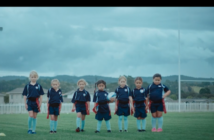It’s becoming increasingly clear that the brands that do well have a clear sense of purpose or identity. According to research, the 50 fastest growing brands serve a ‘higher purpose’. The purpose can be anything from creating a sense of joy, a connection with consumers, confidence, practicing sustainability or impacting society positively. If the message is clear, and consumers believe a brand is about more than just making money, they’re perceived more positively.
For Offcut, a brand selling five-panel caps, its purpose is to redefine what we would commonly think of as waste.
The brand’s story began last year when Taylor visited his father’s old warehouse in Christchurch. His father, now retired, used to be a curtain wholesaler.
“[We] walked past a room full of offcut and end-of-the-line fabrics,” says Taylor. “I remember as a kid playing with my sisters in the offcut bins and we never thought about what happened to these new pieces of fabric. But last year I asked dad about what he does with the fabric too small to be turned into curtains and he told me he pays someone to come and pick them up twice a year and throw them into landfill.”
So, that got Taylor thinking. While he says the fabrics weren’t exactly what he’d have hanging in his house as curtains, he figured some of the floral and interestingly patterned pieces would be perfect for caps.
“I’d heard how much of an issue fabric waste was (which he discusses in a TEDx talk here) and how bad it was for the environment and thought, ‘well if there is something I can do on a small scale here, that’s pretty cool’ and create a valuable product out of this product that’s been needlessly classified as waste.”

Matt Purcell, Pedro the dog, Adrien Taylor. Credit: Rupert Storey
Taylor soon teamed up with friend Matt Purcell and Pedro the dog and arranged for the scraps to be sent to a factory in Auckland to be turned into high quality caps and thus, just before Christmas last year, Offcut was born. And though it’s a mere seven months old, it’s already sold around 500 caps with the first few selling out in the first couple of days after the launch.

Credit: Offcut
Want not waste not
For Taylor, the word ‘waste’ may as well be re-classified to ‘potential’.
“We have this word called ‘waste’, which I think is generally a misnomer, it’s generally used in a way that’s not accurate and Offcut is sort of evidence of that,” Taylor says.
“You get this raw material which is perfectly brand new. It’s taken resources, time and human labour to produce and people are throwing it out because they say it’s waste because it’s not big enough to be used for its original intended purpose.”
But, he says, as soon as you start opening your mind you realise there’s no need for it to be waste. “It’s still perfectly a brand new resource that’s taken time and effort, money and environmental cost to produce, so there must be way to make use of that rather than throwing it out to landfill.”
He says another upside is that each cap is limited edition “so you never have to worry about someone else wearing the same Offcut as you”.
The purpose of purpose
So, is it important for all brands to have a higher purpose?
“Yeah,” Taylor says. “I think even beyond the economic argument, where it makes sense to reduce waste.”
Businesses in some way, shape or form should be contributing to the betterment of society, he says. “So, whether that’s reducing waste or reducing your carbon footprint, in my eyes that’s a prerequisite for any business in the 21st century because we just can’t continue on the way we are, consuming and producing to have a sustainable planet that we can live on comfortably for the next 100 years or so.”
He says an environmental purpose is a must for any company. “There is no excuse for not making an effort in that way but also it’s really important for brands to serve a higher purpose than just making money. Because basically, that’s just not really cool morally.”

Credit: Jamie Murcutt
Pay it forward
Further to reducing the amount of waste in the world, Offcut also plants a tree for every cap it sells, which Taylor says in some way offsets the carbon footprint for international and domestic shipping, seeing as trees absorb carbon.
To do this, Offcut partnered with a charity called Trees for the Future, which is American based and plants fruit trees in African countries so farmers can make a living off the trees.
While he didn’t have the cost of planting the trees at the top of his head, Taylor says the cost is “reasonably minimal”.
“It’s still an expense that we didn’t need to have but we wanted to do it right from the start.”
Taylor refers to a Toms, a shoe brand which influenced his decision to adopt the ‘one for one’ model, where with every product purchased it helps a person in need by providing “shoes, sight, water, safe birth and bullying prevention services”, according to its website.
“I wanted to do something similar but realised someone who is in poverty doesn’t necessarily need a cap, it’s not really a necessity … but you can never have enough trees.”

Credit: Adrien Taylor
And though it hasn’t been announced yet, Taylor says he plans to start planting trees with Offcut in New Zealand towards the end of the year, despite the cost being greater. “It’s something that we want to do and feels right and is pretty important to me. There is an incredibly good feeling that comes with planting a tree.”
He says it’s not about boosting marketing capacity in New Zealand, it just makes sense to plant trees here. “It just feels good to me selfishly. I love New Zealand and if we are making the caps here it makes sense to plant the trees here. It’s going to cost us a lot more but I think it’s worthwhile from a personal perspective.”
Purpose and profitability
As is reflected in the research by Procter & Gamble’s former global marketing officer Jim Stengel for his book Grow, Taylor says people are attracted to the brand because of what it represents.
 “People are more likely to buy your product if buying it makes them feel good about not only looking good but knowing that they are doing something that’s not causing a whole lot of harm to the environment when they buy that product.”
“People are more likely to buy your product if buying it makes them feel good about not only looking good but knowing that they are doing something that’s not causing a whole lot of harm to the environment when they buy that product.”
More and more people are demanding purpose, he says. “A lot of brands are catching on and I think that’s a direct response to consumers demanding that.”
As for Offcut’s profitability, at the moment he’s not paying himself a salary and he’s a wee way off from that but considering the business is only half a year old, he’s pleased with how things are going.
“Offcut is paying its own way. We’re not in debt and we are not owing any money and we haven’t taken on any investments. Basically, all the money we are making we are putting back into online marketing.”
He says at this stage the money made is going back into manufacturing and growing the business.
“I’m conscious of trying to grow it quickly. There is something about a new business that people get behind and you’re the cool flavour of the month for a short amount of time so you really want to maximise the exposure you get as much as possible. So, I’m trying to leverage that but at the same time not sinking hundreds of thousands of dollars into it.”
He says a lot of start-ups don’t have sustainable business models behind them. “Because they have been funded to the teeth and realise a few years down the track that they have never turned over a profit and go under. So we are trying to undertake a more sustainable approach to Offcut’s business model.”

Credit: Adrien Taylor
Looking ahead
Taylor says in the future the brand would consider working with other kinds of ‘waste’. “Without giving too much away, there are definitely other offcuts out there that we could turn into something valuable,” he says.
“So the Offcut ethos can definitely be applied to other industries, but at the moment I’m learning so much from doing one product. We want to be known as doing one product really well before doing other stuff, I just want to nail caps first … and then I’m sure we could apply it beyond that.”

Credit: Bernat Pomerol
Taylor says people often ask him what individuals can do about climate change or the environmental impact that mankind has had on the planet.
“I always say ‘Well, every time you buy something your money is a vote, so vote for the brand you believe in…’. Big brands will catch onto that because people are demanding it. They will no longer buy products that show an environmental lack of responsibility.”
And if oil spills, palm oil use and emissions scandals can teach us anything, it’s that if a brand is up to no good, it won’t be easily forgotten.













